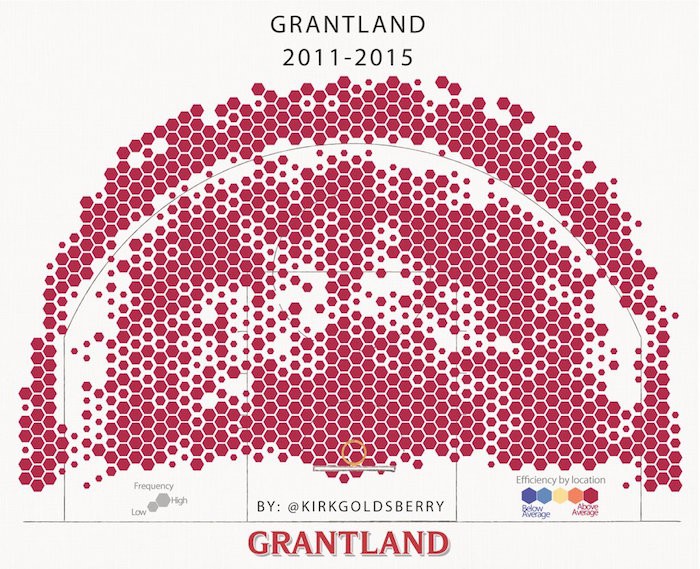
Grantland, the sports-and-culture site launched by Bill Simmons for ESPN in 2011, is shutting down, ESPN said in a brief statement on its website Friday afternoon:
Grantland.com was still up and running as of 2:10 p.m. on Friday, but the announcement appeared to come as a complete surprise to Grantland staffers.Effective immediately we are suspending the publication of Grantland. After careful consideration, we have decided to direct our time and energy going forward to projects that we believe will have a broader and more significant impact across our enterprise.
Grantland distinguished itself with quality writing, smart ideas, original thinking and fun. We are grateful to those who made it so. Bill Simmons was passionately committed to the site and proved to be an outstanding editor with a real eye for talent. Thanks to all the other writers, editors and staff who worked very hard to create content with an identifiable sensibility and consistent intelligence and quality. We also extend our thanks to Chris Connelly who stepped in to help us maintain the site these past five months as he returns to his prior role.
Despite this change, the legacy of smart long-form sports story-telling and innovative short form video content will continue, finding a home on many of our other ESPN platforms.
Well that's the first time I've ever found out I was laid off via Twitter
— Michael Baumann (@MJ_Baumann) October 30, 2015
ESPN's handling of @Grantland33 and its staff post-Simmons has been, to be blunt, a train wreck. That staff deserved much better.
— Richard Deitsch (@richarddeitsch) October 30, 2015
Good of ESPN to specify exactly why they’re closing Grantland pic.twitter.com/xfeVj4FqWe
— Sexy Giles Corey (@rustyk5) October 30, 2015
The site — nearly universally lauded for high quality writing about sports and culture — had experienced a very troubled 2015. In May, ESPN decided not to renew Simmons’ contract (another fact that many Grantland staffers learned via Twitter). Since then, Simmons, who signed a contract with HBO, has heavily criticized ESPN for failing to support the site, including in an episode of his new podcast.
I loved everyone I worked with at G and loved what we built. Watching good/kind/talented people get treated so callously = simply appalling.
— Bill Simmons (@BillSimmons) October 30, 2015
it's good business to periodically remind your readers that nothing is permanent and life is a dark abyss of disappointment and death
— Olivia Nuzzi (@Olivianuzzi) October 30, 2015
Grantland was incredible & ESPN is ridiculous. I'm a person who never reads anything about sports & I read that site all the time.
— emily nussboo (@emilynussbaum) October 30, 2015
At the time of Simmons’ firing, ESPN president John Skipper had said that ESPN “remained committed to Grantland.” Chris Connelly replaced Simmons as interim editor, but several of the site’s high-profile staffers had left in recent weeks and months, including publisher David Cho, film critic Wesley Morris, and staff writer Rembert Browne.
— Rembert Browne (@rembert) October 30, 2015
ESPN to me on May 15: They are supporting Grantland for the "longterm." https://t.co/5566zU5CB1
— Richard Deitsch (@richarddeitsch) October 30, 2015
The closure of Grantland comes in the context of a larger round of cuts that included roughly 300 layoffs earlier this month. ESPN — long an enormous moneymaker for parent Disney — has seen the impact of the huge, multi-billion-dollar broadcast rights deals the network has done with the NFL, NBA, MLB, and others.
The rights to live sports have been seen as a key part of maintaining the cable bundle — the mesh of relationships between networks, cable companies, and consumers that have sustained much of the modern TV industry. As more viewing moves to Netflix, Amazon Prime, Hulu, YouTube, and other digital platforms, the thinking was that the real-time nature of a high-profile match would keep people paying $100 or more each month for cable.
But Disney and other TV companies saw their stock drop in August when CEO Bob Iger confirmed a decline in ESPN’s subscriber base, in large part driven by cord-cutters and others happy with a slimmer bundle of paid TV services. The high-dollar bet on sports rights and a declining subscriber base could spell trouble for the company’s future outlook.
The shuttering of Grantland raises (further) questions about about the fates of two other ESPN-owned media properties, FiveThirtyEight and The Undefeated, though an ESPN spokeswoman told CNN’s Brian Stelter that the network is “totally committed” to those sites.
All Grantland writers will have their contracts honored. The intent is to use the sportswriters on other ESPN platforms.
— Mike Soltys (@espnmikes) October 30, 2015
Senior ESPN source: "We're getting out of the pop culture business." https://t.co/dWNvwRwALb
— Brian Stelter (@brianstelter) October 30, 2015
“It’s always good to dabble in different things,” Simmons told Recode’s Peter Kafka in March, when he was still at Grantland. “But sometimes when you dabble in different things, they turn into something. I think you have a responsibility at that point to decide ‘All right — something happened here. This is a really good thing. Now what do we do?'”